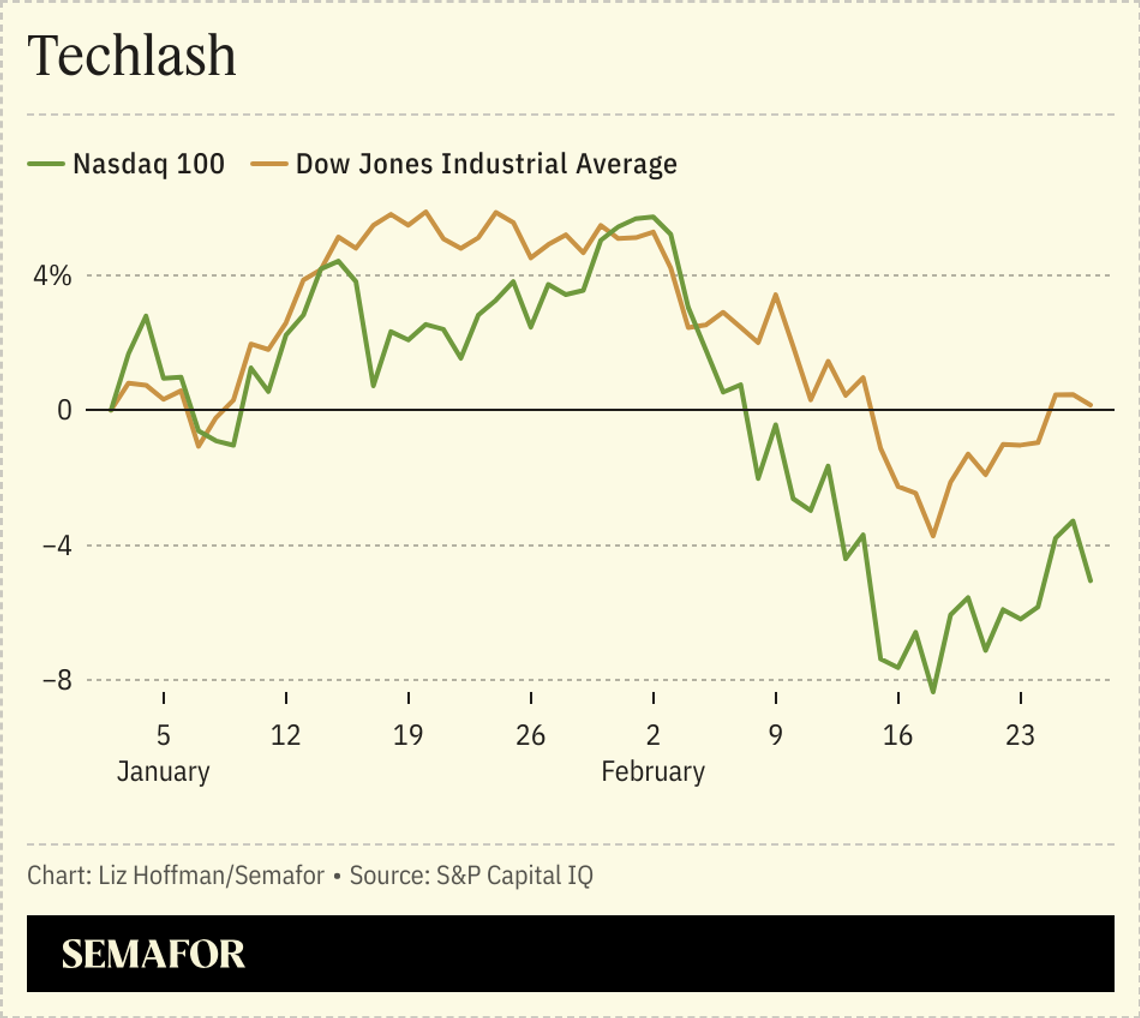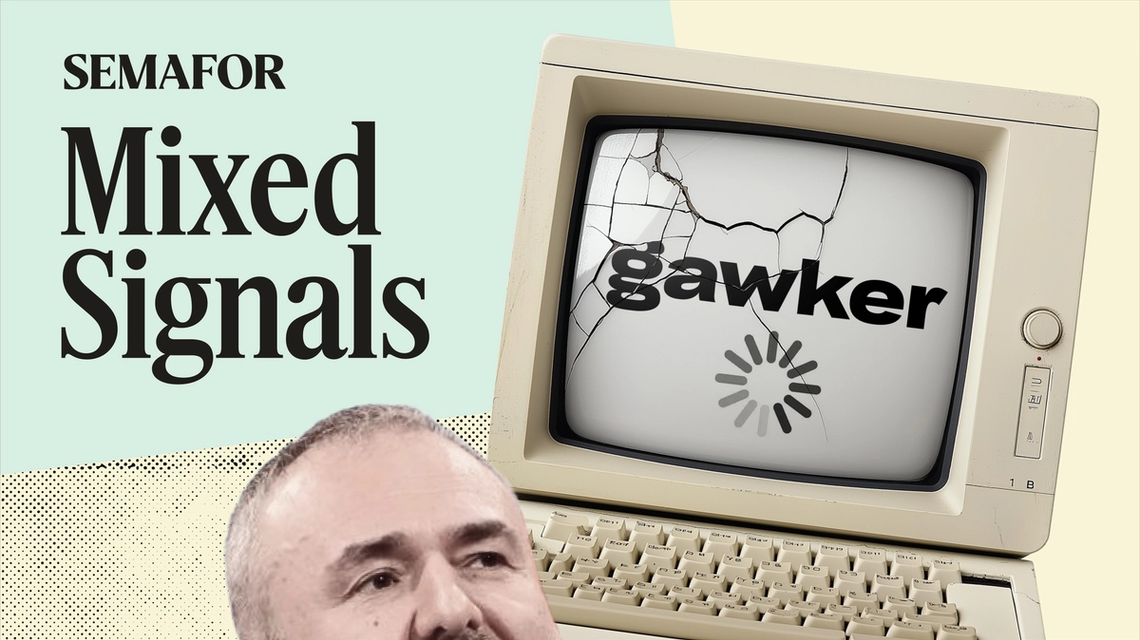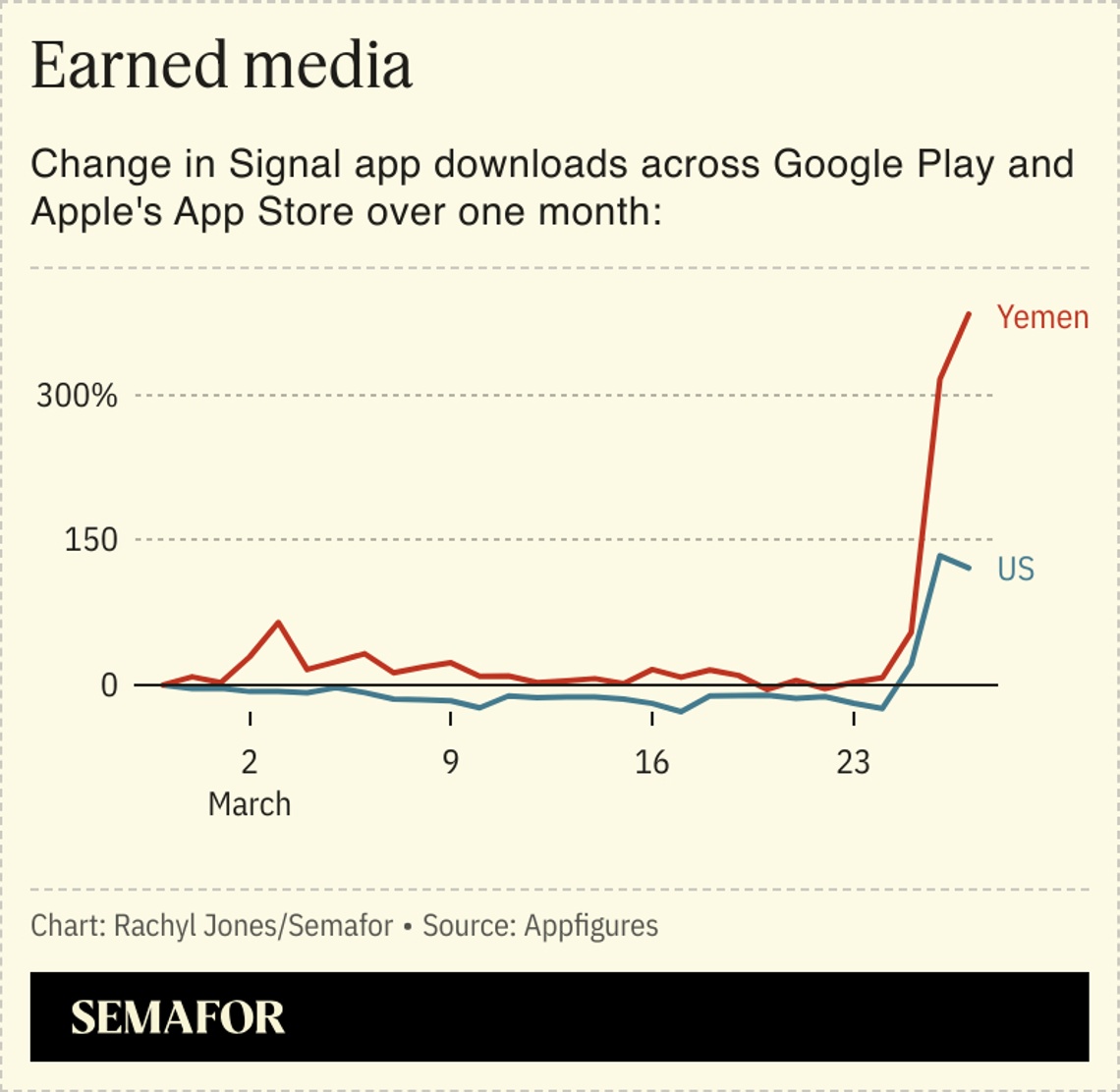| In this edition, how OpenAI’s GPU dilemma speaks to its fundamental operation, and Signal gets a boo͏ ͏ ͏ ͏ ͏ ͏ |
 | Reed Albergotti |
|
Hi, and welcome back to Semafor Tech.
OpenAI’s new image model service — which allows users to create perfect text inside of images — took the internet by storm this week, once again straining the resources of the rapidly expanding network of compute power available to tech companies. “it’s super fun seeing people love images in chatgpt. but our GPUs are melting,” its CEO Sam Altman, whose punctuation choices are something of a mystery, posted on X.
Users flooded X with memes in the style of Studio Ghibli, but the bigger-picture takeaway was missed. OpenAI’s power is no longer its ability to create the AI models (its image service is actually a combo of different models and processes), but the fact that it has a growing base of consumer customers who are addicted to its products. This transition happened a while ago. It hired veteran product manager Kevin Weil last summer, and we’re starting to see the fruits of that decision in everything from image generation to coding tools.
Here’s the fundamental fact about OpenAI: It needs to compete in AI research, but it doesn’t need to win by a mile. And at some point, it might not need to be an AI research company at all. It might make more sense for OpenAI to become a data center company to improve its margins.
In every wave of technology, only a small handful of consumer brands are financially successful. With each viral product launch, OpenAI moves more in that direction.
The only risk is that it keeps “melting” its GPUs. That’s not OpenAI’s fault, but not being able to meet demand is something that can hinder a consumer brand. That’s what happened to companies like the defunct Friendster. While OpenAI is not the same as social media, it surely isn’t something Altman likes to see.
➚ MOVE FAST: Victor. Anthropic won a legal battle against Universal Music and other record labels, which tried to stop the startup from using copyrighted lyrics to train AI models. A US court ruled that the music companies, which represent Taylor Swift and other artists, didn’t prove reputational or market harm — which could have implications for similar cases. ➘ BREAK THINGS: Spoils. CoreWeave, once an AI darling, is downsizing its planned IPO. That will put its valuation closer to $23 billion, a nearly 25% drop from its original target. As we wrote earlier this week, it may be more of a sign that the company, which started as a bitcoin miner, is falling behind in the AI race.  |
|
 Dartmouth/YouTube Dartmouth/YouTubeNothing is black and white in the AI world. On Wednesday, we reported on a study from OpenAI and MIT that found heightened chatbot usage can contribute to loneliness and decreased socialization. However, that doesn’t mean there isn’t a role for AI to play in improving mental health. A Dartmouth study published Thursday reveals that individuals who engaged with a therapy chatbot for eight weeks saw positive results comparable to when working with a “gold-standard” mental health professional. Dartmouth monitored 106 individuals across the US with access to its TheraBot phone app, an on-demand chatbot trained on transcripts of hypothetical conversations between therapists and patients written by researchers. Users diagnosed with mental health disorders communicated with TheraBot about how they were feeling when they needed to talk. Over the trial period, those with depression saw a 51% reduction in symptoms, while people with anxiety and eating disorders experienced a 31% and 19% decrease, respectively. “There is no replacement for in-person care, but there are nowhere near enough providers to go around,” the study’s senior author Nicholas Jacobson told the university’s news site. With depression rates hitting new highs in recent years, AI-powered therapy could help expand access to real-time mental health services. That requires, of course, robust quality testing to ensure the responses are rooted in therapeutic best practices (which Dartmouth says its training dialogues have integrated). Other wellness-branded chatbots have been shut down in the past for giving harmful suggestions. |
|
 The annual revenue Huawei is expected to confirm for last year, just short of the company’s peak sales in 2020, Reuters reported. The figure, up roughly 20% from the year prior, indicates the Chinese tech company has recovered from US sanctions that restricted its access to essential technologies and at one point cut its consumer business sales in half. |
|
 Nick Denton, the founder of Gawker, more or less disappeared from the internet in 2017, after a public legal battle with Hulk Hogan (backed by Peter Thiel) resulted in the site being shut down. That is until earlier this month, when Denton suddenly reappeared on X, tweeting over 200 times over the course of days. In his first podcast appearance since his recent return, Ben and Max talk to the former digital media mogul about why he’s come back after almost a decade of relative anonymity, and his new AI venture for journalism. They also discuss why he’s short on Tesla and Elon Musk and long on China, and ask him how he looks back on his Gawker days today. |
|
 Since war plans leaked this week, global downloads for Signal have roughly doubled, app tracking firm Appfigures told Semafor. (TechCrunch first reported on the boost). In the US, daily downloads tripled to more than 60,000. In Yemen, where the app is less popular, downloads increased by five times to more than 1,000 per day, bringing the platform from No. 50 in the iOS social media app rankings to No. 9 in the country today. While the news resurfaced privacy concerns that may drive users to encrypted apps, the boost could also suggest growing adoption from bad actors. Many terrorist groups operate in Yemen, according to the US State Department, including the Houthis, who were the target of the airstrikes discussed in the leaked Signal communications. Terrorist organizations have been known to use encrypted chat platforms in the past, making it difficult for law enforcement to track their communications and movements. ISIS reportedly used Telegram and WhatsApp to plan the 2015 attack in Paris, and the companies faced pressure in the following years to remove extremist content and turn over account details to governments. Signal has yet to come under public scrutiny for that reason, though it’s likely to spur deeper discussions on digital privacy in the US as Democrats cried foul and a lawsuit was filed this week. |
|
 A data center in Virginia. Leah Millis/Reuters. A data center in Virginia. Leah Millis/Reuters.An MIT Tech Review article offers a fascinating look at the AI landscape in China. Unlike the US, where tech companies seem to struggle to keep up with demand, China’s data centers are going unused. The article illustrates how technology in China develops differently than in the US. When there’s a new trend, especially involving the physical world, China moves incredibly fast, building gadgets and even data centers in record time. It’s very centralized and top-down. On the other hand, large tech companies in the US understood that AI would, at some point, take off like wildfire. But it wasn’t until ChatGPT became an internet sensation that the giants sprung into action, looking for creative ways to use a new resource or iterate on ideas. The “builder” mentality among US entrepreneurs is strong in software, but that’s mainly because the US lost its ability to produce physical things. Once entrepreneurs figure out use cases for generative AI and build successful companies around those ideas, we’ll see it catch on quickly in China, putting those data centers to use. Just like there’s a “Google of China” and an “Amazon of China,” there will be the same dynamic in the AI-driven era. |
|
  Evelyn Hockstein/Reuters Evelyn Hockstein/ReutersDonald Trump has famously traded on the phrase, “you’re fired.” But he’s held off on that remark in his White House this time — even for things that might have led to sackings during his first term, Semafor’s Shelby Talcott and Burgess Everett report. Trump ally Steve Bannon believes the president has learned some lessons since then, describing a “no scalps policy” that’s in part fueled by the ghosts of term one. Trump is partly reluctant to fire folks — even Mike Waltz, who’s at the center of the Signal drama — because he doesn’t want to be seen as giving opponents a win. |
|








